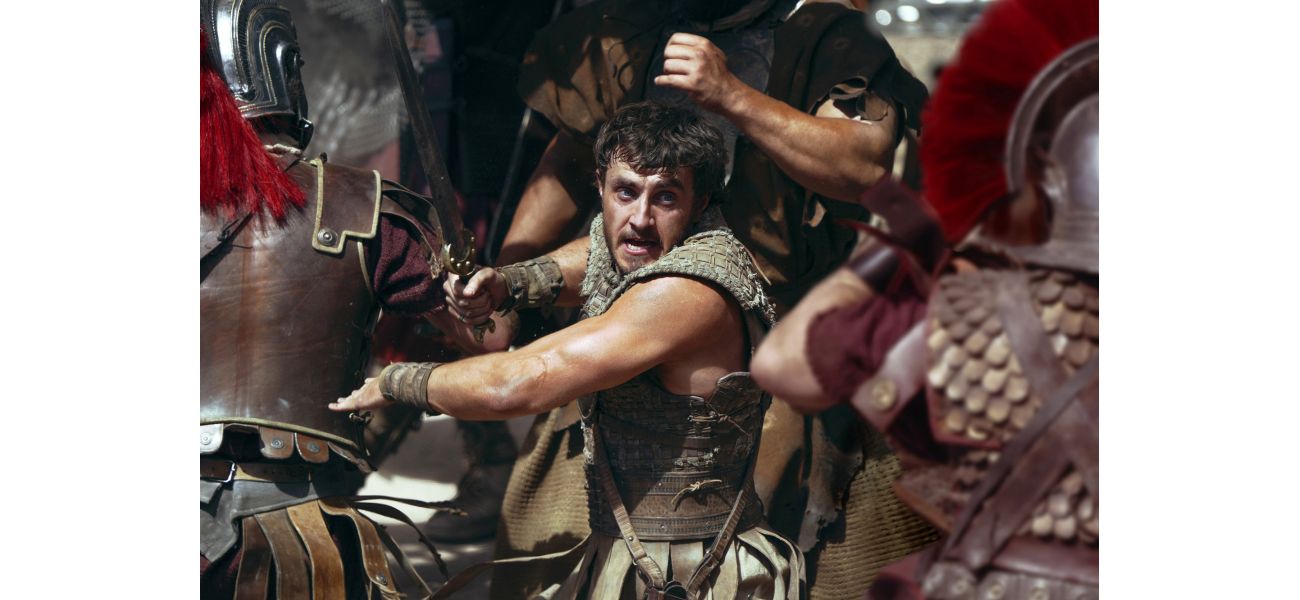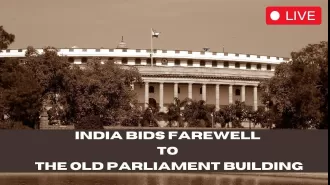Ridley Scott's sequel Gladiator II may not be a masterpiece, but it's still enjoyable.
Get ready for some fun!
November 15th 2024.

Sir Ridley Scott's much-anticipated return to Rome is a bold and absorbing one, though it falls short of perfection. Gladiator II, the sequel to the 2000 classic, takes place nearly 25 years after the events of the original film. It is a truly epic and daring continuation of the story that first captivated audiences with Russell Crowe's quest for revenge against a corrupt emperor.
That being said, I would hesitate to call it a masterpiece, as some initial reactions on social media have. It is clear that director Ridley Scott has put a great deal of thought into this sequel, being mindful of the challenges that come with following up such a beloved film. While Gladiator II certainly does not tarnish the legacy of its predecessor, there are a few missteps that drew awkward laughter at my screening. These mainly occurred when screenwriter David Scarpa and Scott were too heavy-handed in their attempts to connect the sequel to the first film.
The story that Scott ultimately settled on for his return to Rome, written by Scarpa from an idea by him and Peter Craig, is well-crafted in its motives and action. It follows a similar structure to that of Maximus Decimus Meridius, with a gifted warrior named Lucius who is taken into slavery after his wife and child are killed by invading Roman forces. However, what sets this story apart is that Lucius is the secret son of Maximus and the late Emperor Marcus Aurelius’s daughter, Lucilla. He has been living in hiding in Numidia, while the general leading the army, Marcus Acacius, was trained by Maximus and is now married to Lucilla. It's a juicy plot, to say the least.
Lucius's journey as a captive follows a similar path to that of his father's, showcasing his impressive fighting skills and ultimately leading him to become a respected gladiator. He is sent to fight to the death in the Colosseum during a festival, multiple times. Paul Mescal delivers a truly believable performance as Lucius, showcasing his capabilities as well as the underlying fury that drives him. He proves to be a commendable leading man, though at times his character feels underdeveloped and emotionally restrained. There are moments, such as the drastic shift in his behavior towards Lucilla in two separate encounters, where it feels like the script may have cut too much from his character.
Alongside the traditional elements of sword and sandal films, such as the twang of bowstrings and roaring explosions of catapult bombs, Scott also delivers plenty of old-school blood and gore. Gladiators are brutally executed in various ways, including being impaled by a rhino horn, beheaded, and even devoured by bloodthirsty baboons. This adds to the authenticity of the film, as Scott has made some creative choices that have already sparked some controversy. However, this has never stopped him before from delivering entertaining and engaging films to his fans. One example of this is Emperor Geta, who co-rules with his syphilis-ridden brother Caracalla and doubles down on the reversed thumbs up and down ruling in the arena. Scott remains unapologetic for any historical inaccuracies, and I personally admire that about him.
Gladiator II does follow a similar structure to the first film, with Lucius's journey mirroring that of Maximus. However, the action and stakes have been taken up a notch, with multiple arena fights and deadly opponents. Joaquin Phoenix's Commodus may be a tough act to follow, but Joaquin Quinn delivers a chilling performance as Geta, who forms a debauched and corrupt ruling force with his addled brother. While they may not be as formidable as Commodus, they provide a grotesque representation of the excesses of Rome. Moreover, they make room for the true villain of the story, Denzel Washington's Macrinus. He is a former slave turned arms dealer and gladiator owner, who mentors Lucius and has his own ambitions to control Rome. He is a ruthless and calculating character, with no qualms about his actions. Washington's performance is the standout in the film, and I wouldn't be surprised if he receives yet another Oscar for it. He brings a unique charisma and confidence to the role, making Macrinus a fan favorite despite his villainous nature.
However, Washington's larger-than-life portrayal can sometimes make Pedro's Acacius and Connie Nielsen's Lucilla seem too serious in comparison. This may be because their characters are dealing with more serious issues, but it almost feels like they are acting in a different film. This is not helped by some of the embarrassingly obvious decisions, such as a Roman statue and a servant extra that are too on-the-nose and undermine the urgency of their scenes. These may be small details, but they are noticeable.
The climax of the film seems to come twice, with Lucius delivering multiple stirring speeches to the masses. While Mescal delivers these with great conviction, it does feel like the film could have been trimmed down from its 148-minute runtime to avoid some repetition.
One of the most significant revelations about Gladiator II is the fact that Denzel Washington's character, Macrinus, had a kiss with another man that was ultimately cut from the film. This was a devastating blow for Washington, who spoke about it in a recent interview. He mentioned that he had kissed a man full on the lips, but it was ultimately cut from the film because the studio wasn't ready for it yet. He joked that he killed the man about five minutes later, as it was the "kiss of death" in Gladiator.
Despite a few issues, Gladiator II is a compelling and entertaining film that showcases the ambitious scope and effort that went into its creation. There may be some minor flaws, but no one else is making epic films like Sir Ridley Scott. While it may not reach the same heights as the first Gladiator, it is still a worthy sequel with plenty to admire. I, for one, am already looking forward to watching it again.
That being said, I would hesitate to call it a masterpiece, as some initial reactions on social media have. It is clear that director Ridley Scott has put a great deal of thought into this sequel, being mindful of the challenges that come with following up such a beloved film. While Gladiator II certainly does not tarnish the legacy of its predecessor, there are a few missteps that drew awkward laughter at my screening. These mainly occurred when screenwriter David Scarpa and Scott were too heavy-handed in their attempts to connect the sequel to the first film.
The story that Scott ultimately settled on for his return to Rome, written by Scarpa from an idea by him and Peter Craig, is well-crafted in its motives and action. It follows a similar structure to that of Maximus Decimus Meridius, with a gifted warrior named Lucius who is taken into slavery after his wife and child are killed by invading Roman forces. However, what sets this story apart is that Lucius is the secret son of Maximus and the late Emperor Marcus Aurelius’s daughter, Lucilla. He has been living in hiding in Numidia, while the general leading the army, Marcus Acacius, was trained by Maximus and is now married to Lucilla. It's a juicy plot, to say the least.
Lucius's journey as a captive follows a similar path to that of his father's, showcasing his impressive fighting skills and ultimately leading him to become a respected gladiator. He is sent to fight to the death in the Colosseum during a festival, multiple times. Paul Mescal delivers a truly believable performance as Lucius, showcasing his capabilities as well as the underlying fury that drives him. He proves to be a commendable leading man, though at times his character feels underdeveloped and emotionally restrained. There are moments, such as the drastic shift in his behavior towards Lucilla in two separate encounters, where it feels like the script may have cut too much from his character.
Alongside the traditional elements of sword and sandal films, such as the twang of bowstrings and roaring explosions of catapult bombs, Scott also delivers plenty of old-school blood and gore. Gladiators are brutally executed in various ways, including being impaled by a rhino horn, beheaded, and even devoured by bloodthirsty baboons. This adds to the authenticity of the film, as Scott has made some creative choices that have already sparked some controversy. However, this has never stopped him before from delivering entertaining and engaging films to his fans. One example of this is Emperor Geta, who co-rules with his syphilis-ridden brother Caracalla and doubles down on the reversed thumbs up and down ruling in the arena. Scott remains unapologetic for any historical inaccuracies, and I personally admire that about him.
Gladiator II does follow a similar structure to the first film, with Lucius's journey mirroring that of Maximus. However, the action and stakes have been taken up a notch, with multiple arena fights and deadly opponents. Joaquin Phoenix's Commodus may be a tough act to follow, but Joaquin Quinn delivers a chilling performance as Geta, who forms a debauched and corrupt ruling force with his addled brother. While they may not be as formidable as Commodus, they provide a grotesque representation of the excesses of Rome. Moreover, they make room for the true villain of the story, Denzel Washington's Macrinus. He is a former slave turned arms dealer and gladiator owner, who mentors Lucius and has his own ambitions to control Rome. He is a ruthless and calculating character, with no qualms about his actions. Washington's performance is the standout in the film, and I wouldn't be surprised if he receives yet another Oscar for it. He brings a unique charisma and confidence to the role, making Macrinus a fan favorite despite his villainous nature.
However, Washington's larger-than-life portrayal can sometimes make Pedro's Acacius and Connie Nielsen's Lucilla seem too serious in comparison. This may be because their characters are dealing with more serious issues, but it almost feels like they are acting in a different film. This is not helped by some of the embarrassingly obvious decisions, such as a Roman statue and a servant extra that are too on-the-nose and undermine the urgency of their scenes. These may be small details, but they are noticeable.
The climax of the film seems to come twice, with Lucius delivering multiple stirring speeches to the masses. While Mescal delivers these with great conviction, it does feel like the film could have been trimmed down from its 148-minute runtime to avoid some repetition.
One of the most significant revelations about Gladiator II is the fact that Denzel Washington's character, Macrinus, had a kiss with another man that was ultimately cut from the film. This was a devastating blow for Washington, who spoke about it in a recent interview. He mentioned that he had kissed a man full on the lips, but it was ultimately cut from the film because the studio wasn't ready for it yet. He joked that he killed the man about five minutes later, as it was the "kiss of death" in Gladiator.
Despite a few issues, Gladiator II is a compelling and entertaining film that showcases the ambitious scope and effort that went into its creation. There may be some minor flaws, but no one else is making epic films like Sir Ridley Scott. While it may not reach the same heights as the first Gladiator, it is still a worthy sequel with plenty to admire. I, for one, am already looking forward to watching it again.
[This article has been trending online recently and has been generated with AI. Your feed is customized.]
[Generative AI is experimental.]
0
0
Submit Comment





